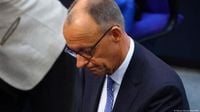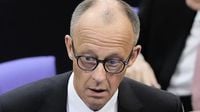Germany's conservative leader Friedrich Merz faced a historic setback on May 6, 2025, when he failed to secure the necessary votes in the Bundestag to become the country's next chancellor. Merz, who leads the Christian Democratic Union (CDU), received only 310 votes in the first round of voting, falling short of the 316 votes required for an absolute majority in the 630-member parliament. This unprecedented outcome marks the first time in post-war German history that a chancellor-designate has failed to win a majority in the initial ballot.
Despite being the frontrunner following his party's success in the February federal elections, where the CDU/CSU coalition topped the polls with 28.5 percent of the vote, Merz's defeat has raised questions about the stability of his coalition with the centre-left Social Democrats (SPD), which secured just 16.4 percent. The coalition, formed just a day before the vote, holds a nominal majority of 328 seats in the Bundestag, yet 18 members who were expected to support him either abstained or voted against him.
As the Bundestag President Julia Klöckner announced the results, a stunned silence enveloped the chamber. The session was quickly adjourned to allow parliamentary groups to regroup and discuss the next steps. The Bundestag has 14 days to elect a chancellor, and while a second vote is possible, it will not happen on the same day due to concerns about Merz's prospects.
Political commentators have described Merz's failure as a "complete catastrophe" and a "punch to the stomach" for the 69-year-old leader, who had anticipated a smooth transition into the chancellorship. The far-right Alternative for Germany (AfD), which came second in the February elections with 20.8 percent, seized on the opportunity to call for fresh elections, with party leader Alice Weidel stating, "Merz should step aside and the way should be cleared for a general election."
Merz's coalition partners, the SPD, have distanced themselves from the blame, with SPD leader Lars Klingbeil asserting that all party members were present for the vote and that they had fulfilled their obligations. However, the dissent within the coalition raises significant concerns about its long-term viability.
Uli Brueckner, a political science professor at Stanford University, noted the implications of the vote, suggesting that the far-right AfD would be "celebrating" the outcome. He indicated that the current political climate in Germany reflects a serious crisis of legitimacy, exacerbated by external influences from countries like the United States and Russia.
The implications of Merz's failure extend beyond the immediate political landscape. The DAX stock market index reacted negatively to the news, dropping 1.1 percent shortly after the announcement, as investor confidence wavered amid uncertainty about Germany's political future. Economists have already warned of potential risks to German exports, particularly due to tariffs imposed by the United States, and the contraction of the services sector adds to the economic challenges Merz will need to address.
Merz's immediate decision-making will be crucial as he consults with his coalition partners. The CDU and SPD have previously governed together under former Chancellor Angela Merkel, but the current coalition's stability is now in question. The failure to secure a majority in the first round raises concerns about the coalition's ability to govern effectively and fulfill its ambitious goals, which include stimulating economic growth and tightening immigration policies.
In the wake of this political turmoil, the Bundestag will reconvene to discuss the next steps. If a second vote is scheduled, it will be essential for Merz to secure the necessary support, as another defeat would significantly undermine his credibility and leadership prospects. The political landscape in Germany is shifting, and the outcome of this vote may have far-reaching consequences for the future direction of the country.
As Germany grapples with the fallout from this unprecedented event, questions linger about the ability of Merz to lead effectively in a time of uncertainty. With the far-right opposition poised to capitalize on the coalition's weaknesses, the coming days will be critical for the future of Germany's government and its role on the European stage.







